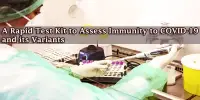FDA-approved medicines that are sold at your local drugstore can successfully treat superbugs, according to a recent test. But because the gold-standard test indicates they won’t function, they are not prescribed. The new test, which is freely available to everyone, may enhance how antibiotics are created, examined, and prescribed.
By boosting efforts to identify novel antibiotics and optimizing the prescription and usage of currently available ones, the research has substantial effects on the fight against bacterial resistance.
Developed by a research team of UC Santa Barbara scientists, the antibiotic study was published in the journal Cell Reports Medicine. The study addressed a critical shortcoming in the medical model used to assess antibiotic resistance. Environmental factors in the body that affect medicine potency are not taken into consideration.
The novel approach discovered numerous efficient antibiotics that were disregarded by conventional testing by imitating bodily conditions. Additionally, a virtually flawless prediction of treatment success or failure was seen when the novel and traditional tests concurred.
Human clinical safety and efficacy studies will need to be conducted to assure these findings are applicable to patients with various infections and sepsis.
Jeffrey Fried
A labor-intensive screening of more than 500 antibiotic-bacteria combinations was necessary for the investigation. The findings suggest that the standard test is incorrect ~15% of the time. Additionally, since doctors rely on this test to make treatment decisions, this could result in the wrong antibiotic being prescribed.
The project was led by professor Michael Mahan and his UC Santa Barbara research team of Douglas Heithoff, Lucien Barnes and Scott Mahan, along with Santa Barbara Cottage Hospital physicians Lynn Fitzgibbons, M.D. and Jeffrey Fried, M.D., and professor John House of University of Sydney, Australia.
“People are not Petri plates that is why antibiotics fail,” said Mahan. “Testing under conditions that mimic the body improves the accuracy by which lab tests predict drug potency.”
Physicians are aware of the flaws in the gold-standard test. They must rely on their experience to choose the best antibiotic(s) for their patients when the suggested antibiotics do not work.
This work offers a potential remedy for the discrepancy between the efficacy of antibiotics as determined by conventional testing and real patient outcomes.
“Reevaluation of FDA-approved antibiotics may be of far greater benefit than the time and cost of developing new drugs to combat antimicrobial resistance,” explained Fitzgibbons, an infectious disease physician, “potentially leading to significant life-savings and cost-savings.”
“Sepsis treatments are expensive and require long hospital stays,” explained Heithoff, “and testing and re-testing is not only time- and labor-intensive, but also leads to antibiotic resistance.”
The new test will result in lower costs for the healthcare sector’s search for new medications to combat illnesses resistant to antibiotics.
“More accurate testing reduces the costs of drug discovery by streamlining detection of lead candidates long before expensive human clinical trials,” said House, a clinical veterinarian.
Added Fried, a critical care physician, “Human clinical safety and efficacy studies will need to be conducted to assure these findings are applicable to patients with various infections and sepsis.”
Grants from the National Institutes of Health’s National Heart, Lung, and Blood Institute, and the U.S. Army Research Office via the Institute for Collaborative Biotechnologies (ICB) cooperative agreement and contract funded this research.
“As a Gaucho, I’m always proud to advance legislation that delivers critical support for the great work that UCSB ICB and other researchers are doing,” said Rep. Salud Carbajal. “With the support provided from the laws created by my colleagues and I on the Armed Services Committee, UCSB ICB was able to develop a new test method which revealed that FDA-approved antibiotics can effectively treat multidrug-resistant superbugs. This would be a game changer for many in our community with limited access to health care, and I’m proud to see the support included in the legislation I helped get signed into law play a part in this breakthrough.”
















